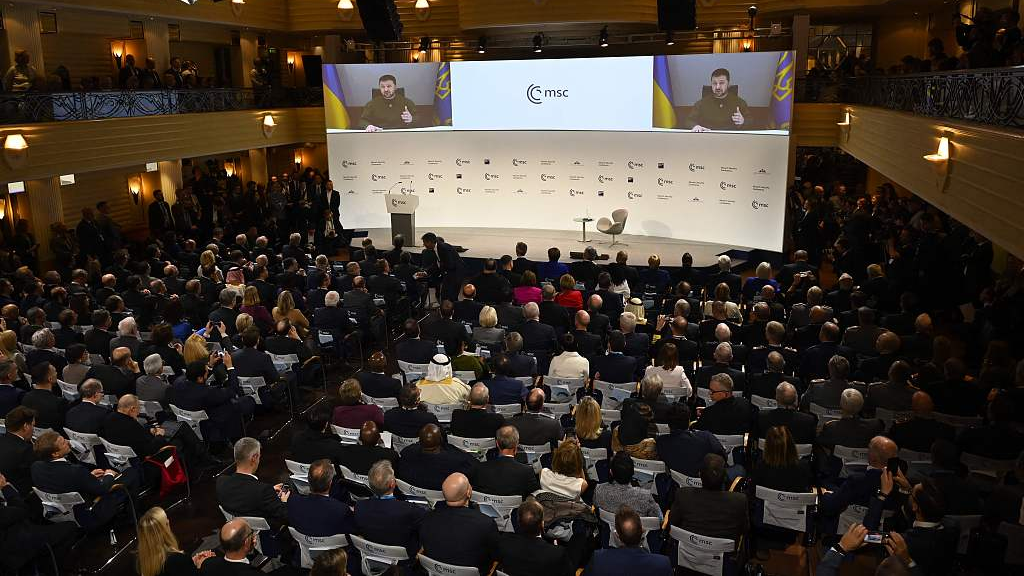
Participants watch Ukrainian President Volodymyr Zelenskyy on a screen during the Munich Security Conference in Munich, southern Germany, February 17, 2023. /CFP
Participants watch Ukrainian President Volodymyr Zelenskyy on a screen during the Munich Security Conference in Munich, southern Germany, February 17, 2023. /CFP
Editor's note: Keith Lamb is a University of Oxford graduate with a Master of Science in Contemporary Chinese Studies. His primary research interests are China's international relations and "socialism with Chinese characteristics." The article reflects the author's opinions and not necessarily the views of CGTN.
The 2023 Munich Security Conference (MSC), which started on February 17, prides itself in bringing leading experts and political decision-makers together, on an "unparalleled platform for high-level debates on key foreign and security policy challenges," with the mission to address the "world's most pressing security concerns."
It strives to increase its geographic diversity by including relevant stakeholders under the principle of everyone learning from each other, rather than lecturing or ignoring one another.
The principle of inclusion is needed in a multipolar world, no longer characterized by transatlantic elites dominating the chat. However, the facts on the ground, as well as a deeper dive into the MSC's "to-do list," prove that there is a schism between the MSC's stated aims and its real aims.
For a start, the conflict in Ukraine will overshadow and condition much of the debate. While undoubtedly Ukraine is an important security concern, it is telling that there is nothing devoted to other serious conflicts, such as Syria, which is still occupied by U.S. troops.
The subject matter and what defines as important for global security may be limited but one would imagine that any conference that seeks inclusivity, while ignoring major stakeholders, would invite all parties to a conflict.
While Russia is a key participant in the Ukraine conflict, Russian officials have not been invited to the 2023 MSC. Instead, the talking points for the conference are about confronting Russia. The aims of the MSC are not to seek a long-lasting peaceful resolution to the Ukraine conflict, but about defining security through a zero-sum lens.
Another notable absence will be Iran, which has attended in the past. This provided a much-needed opportunity for face-to-face interaction between antagonistic opponents, such as the U.S. and Israel. Their 2023 disqualification from the MSC is being put down to "human rights" issues and "Iran using the MSC as a stage to spread anti-Israel propaganda."
However, the message being given off by the MSC, in contrast to their principles, is that when one doesn't agree with the other side, one can ignore them. With the advent of a multipolar world, characterized by other voices possessing increasing economic and military strength, we need increased opportunities for dialogue.
In contrast to Iran's dismissal, Israeli Foreign Minister Eli Cohen will attend. This raises several contradictions related to global security. First, inviting Israel without Iran, a key player in achieving peace in the Middle East, will lead to self-confirming bias and can only stoke enmity.

Eli Cohen (2nd R), Minister of Foreign Affairs of Israel, shakes hand with Michael Brodsky (R), Ambassador of Israel to Ukraine, during the reopening ceremony of the Israeli Embassy in Kyiv, Ukraine, February 16, 2023. /CFP
Eli Cohen (2nd R), Minister of Foreign Affairs of Israel, shakes hand with Michael Brodsky (R), Ambassador of Israel to Ukraine, during the reopening ceremony of the Israeli Embassy in Kyiv, Ukraine, February 16, 2023. /CFP
Secondly, this contradiction is driven to absurdity considering Eli Cohen's recent trip to Ukraine. Here he pledged that "Israel stands firmly in solidarity with the people of Ukraine and remains committed to the sovereignty and territorial integrity of Ukraine." The statement contrasts with the recent news that Israel's cabinet has approved the legalization of nine settler outposts in the occupied West Bank, an announcement that comes amid escalating Israeli-Palestinian violence.
When it comes to world peace and security, even a relatively small conflict between Palestine and Israel can snowball. However, there is no mention of this security issue in the "to-do list" of the MSC for 2023. The MSC is a biased talking shop for transatlantic NATO interests.
With Palestinians feeling, when it comes to security, there are double standards at play, when they feel their right to sovereignty is being trampled on, and when they feel that their issues are being ignored, tensions only increase. Indeed, related to the Palestinian cause, the U.S. Embassy and Consulates in Germany, expecting demonstrations, have issued a security alert coinciding with the 2023 MSC.
There is a clash between the rhetoric and reality of the MSC. It was originally a venue for German participants of NATO to meet with the U.S. and other NATO members. This situation, with Vice President of the United States Kamala Harris being the main speaker for a second year in succession, remains the MSC's purpose to this day.
At times, the MSC has invited other more diverse challenging voices but it seems that their voices haven't been listened to by the West or NATO. Apparently, they were considered economically and militarily weak. Here, without any credible challenge to NATO hegemony, their invitation provided a semblance of openness and equality.
Today, with the "threat" of an arising democratic multipolar world, where other voices are backed by hard economic, military, and increasing soft power, contrary voices, more than ever, need to be heard and consulted with. This includes not only great powers like Russia but also middle powers such as Iran, and smaller powers including Syria and Palestine who, though small in size, play an oversized role when it comes to global security for all.
(If you want to contribute and have specific expertise, please contact us at opinions@cgtn.com. Follow @thouse_opinions on Twitter to discover the latest commentaries in the CGTN Opinion Section.)